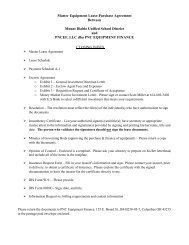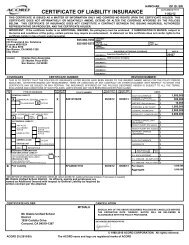Study of the Mount Diablo Unified School District - Mt. Diablo Unified ...
Study of the Mount Diablo Unified School District - Mt. Diablo Unified ...
Study of the Mount Diablo Unified School District - Mt. Diablo Unified ...
- No tags were found...
Create successful ePaper yourself
Turn your PDF publications into a flip-book with our unique Google optimized e-Paper software.
Service Delivery Options and Continuum <strong>of</strong> ServicesMDUSD has effectively demonstrated program development for students that were onceserved in nonpublic placements, such as <strong>the</strong> autism magnet middle school program.MDUSD seems to have <strong>the</strong> capacity for fur<strong>the</strong>r development <strong>of</strong> such programs. O<strong>the</strong>rschools districts such as Franklin Township (NJ), Hampton City (VA), Spotsylvania (VA),Virginia Beach (VA), and Greenwich (CT) have demonstrated similar systems <strong>of</strong> care modelsthat <strong>of</strong>fer district‐based programs for severely disabled students.Consideration for Issue 3‐19:• Reduce nonpublic school placements, building capacity to service students within<strong>the</strong> district.Cost Implications for Issue 3‐19:Cost implications for reducing nonpublic school placements is difficult to ascertain andshould include legal fees, <strong>the</strong> need for <strong>the</strong> development <strong>of</strong> additional classes, hiring <strong>of</strong> staff,and providing related services, such as transportation The district should considerintegration <strong>of</strong> students in NPS into existing service delivery models to <strong>the</strong> greatest extentpossible.3.5 Related ServicesIssue 3‐20: Behavioral Services (Exclusive <strong>of</strong> <strong>the</strong> Mental Health Collaborative).Behavioral services are provided to MDUSD students with identified behavioral needs.These services are in addition to <strong>the</strong> behavioral services provided to students in <strong>the</strong> MentalHealth Collaborative. Many are special education students who require a specific behaviorprogram as part <strong>of</strong> <strong>the</strong>ir IEP. O<strong>the</strong>rs are general education students whose behavioralproblems are significant enough to warrant intervention. Special education teachers havereceived training in <strong>the</strong> process <strong>of</strong> developing and implementing a behavioral support planand school psychologists are available to assist those who need extra support. Currently,<strong>the</strong> MDUSD has two certified behavioral specialists on district staff and are in <strong>the</strong> process <strong>of</strong>recruiting a third. They provide direct support to students and teachers in autism specificclassrooms, as well as consultation for general education students. The district contractswith outside agencies for services that cannot be met by staff members.Research supports <strong>the</strong> use <strong>of</strong> positive behavioral supports (PBS) in addressing <strong>the</strong>behavioral needs <strong>of</strong> students with a wide range <strong>of</strong> disabilities. Strategies utilized in <strong>the</strong>development <strong>of</strong> positive behavioral support plans include determining <strong>the</strong> function <strong>of</strong> <strong>the</strong>problem behavior, <strong>the</strong> determination and implementation <strong>of</strong> proactive environmentalsupports, accommodations to decrease problem behavior, strategies to systematically teachreplacement behaviors, and an individualized reinforcement system. A review <strong>of</strong> MDUSDbehavioral plans found that <strong>the</strong>y utilize positive behavioral supports which are consistentwith research and best practices.MGT <strong>of</strong> America, Inc. Page 3‐27















